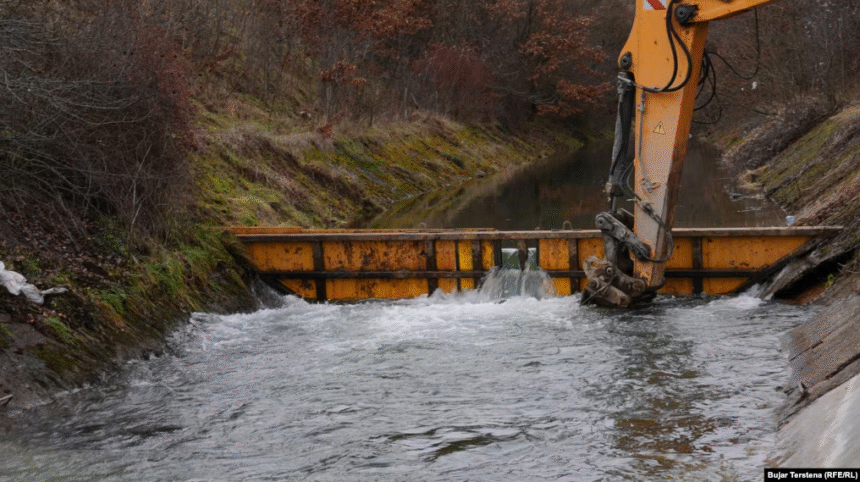Nearly a year after the explosion at the Ibër-Lepenc canal in northern Kosovo, those responsible remain unidentified. Dozens of individuals were arrested, yet only two suspects remain in detention, and Kosovo’s prosecution offers no details beyond confirming that the investigation is ongoing.
The explosion occurred on 29 November 2024 in the village of Varragë. Kosovo labeled the act as terrorism and directly accused Serbia of involvement — accusations that Belgrade denied.
Following the incident, the United States stated there was no evidence directly linking Belgrade to the attack and that it was too early for conclusions. The U.S. confirmed, however, that FBI agents were involved in the investigation.
The Kosovo Special Prosecution told RFE/RL that the case remains under investigation but declined to provide further information.
According to Ehat Miftaraj from the Kosovo Institute of Justice, it is crucial that the investigation be professional and evidence-based, ensuring that “those who committed this violent act are prosecuted.”
The Serbian Public Prosecutor’s Office has not responded to inquiries on whether it is conducting its own investigation. Similarly, EULEX has not disclosed whether it holds information on the case or whether cooperation between Kosovo and Serbia has occurred.
The attack was widely condemned by Western governments, the EU, and NATO, all demanding a full clarification of the circumstances and accountability for the perpetrators.
What Is Ibër-Lepenc?
The Ibër-Lepenc Hydroeconomic Enterprise, headquartered in Prishtina, supplies raw water to industry, water utilities, and agriculture, and produces electricity from the Ujman hydropower plant. The company, established in 1967, is owned entirely by the Government of Kosovo.
What Is Known So Far?
Kosovo authorities have arrested numerous suspects and seized weapons and explosives. Yet, only Dragisha and Jovan Viçentijević remain in pre-trial detention.
Miftaraj notes that the two brothers have been held for a year and stresses that the prosecution must work more efficiently, though it is still within the two-year legal investigation deadline.
According to Betimi për Drejtësi, prosecutors suspect the brothers of terrorism, endangering constitutional order, and public safety, alleging they deliberately damaged the canal using explosives.
Kosovo Police previously stated that approximately 20 kilograms of explosives were used — making it the most serious attack on Kosovo’s critical infrastructure since the war. The damage is estimated at around €400,000.
Political Narratives and Mutual Accusations
Senior Kosovo officials have claimed that former Serbian List vice-president Milan Radoičić stands behind the attack. Radoičić previously took responsibility for the Banjska attack in September 2023, where a Kosovo police officer and three Serb attackers were killed.
Outgoing Prime Minister Albin Kurti said intelligence suggested the Serbian state financed, planned, and supported the Ibër-Lepenc attack.
However, former U.S. Ambassador to Serbia Christopher Hill said the U.S. “sees no evidence pointing toward Belgrade”. Former U.S. Ambassador to Kosovo Jeffrey Hovenier confirmed FBI involvement but emphasized it was still too early to determine responsibility.
Serbian President Aleksandar Vučić stated that what matters is “who stands behind the attack, not who carried it out,” and denied Russian involvement. He said Serbia is ready to cooperate internationally and vowed to arrest any Serbian citizen proved responsible.
Still, he has not disclosed the “information” he claims to possess.
No Legal Cooperation
Kosovo and Serbia do not have direct judicial cooperation, communicating only through EULEX when necessary.
Miftaraj argues that Serbia is avoiding cooperation, not just in this case but in others as well.
Serbian legal expert Vesna Rakić-Vodinelić previously stated that Serbia refuses cooperation because it fears such engagement would imply a relationship resembling state-to-state recognition.
Serbia does not recognize Kosovo’s independence proclaimed in 2008. Although a 2013 justice agreement within the EU-facilitated dialogue obligated Serbia to recognize Kosovo’s judicial authority in Serb-majority municipalities, practical cooperation has never materialized.







